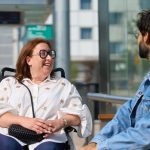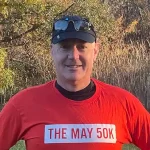Namaste! My name is Muskaan, and I am a person living with multiple sclerosis or MS. I like to say ‘I have MS’ instead of PLW MS (people living with MS) as it reminds me that MS is just one part of me and not something separate or defining.
Diagnosis Story
I was officially diagnosed in March 2023, but looking back when I was growing up in India, my relationship with MS began long before that. Even as a teenager, I remember having these weird sensations, muscle weakness, and sharp pain when water touched my skin.
Doctors were always puzzled and would often give me some multivitamins, but never real answers. Symptoms would always vanish after some time, and for me, it was an unsolved mystery.
Then, when I was 26 and living alone in Melbourne, things got real. One side of my face went weak, and smiling started to feel strange. Talking and swallowing became harder. To everyone else, I looked fine, but I could feel something was off, I was tired all the time, and I could even see asymmetry on my face every time I looked in the mirror.
I went from GP to GP, collecting diagnoses like souvenirs: iron deficiency, ear infections, parotitis, Bell’s palsy, even one time putting me on stroke alert.
Finally, a kind nurse in the ED (Emergency Department) took me seriously and booked every test under the sun. Everything came back normal – blood tests, ultrasound, CT scans, expert opinions. Just before discharging me, she handed me a referral for an MRI and said, “Let’s rule out what’s left”.
Inside the MRI machine, I saw the radiologist’s face drop through the glass, never a good sign by the way! She started making calls, pointing at the screen, and I thought, ‘Oh my god, I’m dying.’
She couldn’t tell me what she saw, instead she just wheeled me straight into the Emergency Department (ED). I cried the whole way, convinced it was something terminal, maybe I have cancer.
I was alone, as I hadn’t told a soul what I had been going through. I guess it’s the perk of being the eldest daughter and having the “I can handle everything” syndrome. Thinking back now, I wish I had family and/or friends with me at the time.
After waiting for some time, which felt like a lifetime, one of the ED doctors told me the MRI scan likely indicates I have MS, but they would need to do some more tests. I cried uncontrollably, not sure if I was relieved it wasn’t terminal or overwhelmed and scared by the MS, which I didn’t know much about.
The MS specialist confirmed the diagnosis after a few weeks, and I wasn’t ready. It was tough, really tough to accept it.
I thought my life was over. All I could see myself was being a burden on my family, in a wheelchair, alone, watching life pass me by. I didn’t want to enjoy anything. I grieved the version of me before the diagnosis, the carefree me who didn’t have to think twice about fatigue or flare-ups. I even wished I didn’t know.
Everything felt like it had changed forever.
And it has, but I now see that as a good thing. Over time, I’ve learned to view it differently. I don’t push myself like I used to. I have a better understanding of why my body felt and reacted the way it used to when I was extremely stressed and what my body needs now. I don’t push myself like I used to. I take more care of myself, eat better, move my body, and rest without guilt. MS has taught me to prioritise me, to slow down, to listen to my body, and to find joy in the smallest things; it has taught me to value the present. MS is teaching me how to live better, not less.
MS and stigma
Still, I don’t talk about it much. Not many people in my world know I have MS. I can count on my fingers the ones who do.
Growing up in an Indian community, stigma around chronic illness and mental health runs deep. It’s seen as shameful, something you hide. People assume your life is doomed, that you are defective, or you are responsible for getting this, or that somehow you “deserved it”.
For women, there’s the added pressure. Being diagnosed means you’re suddenly “unfit” for marriage, that anyone who marries you is taking on a burden. No one deserves you.
So, I learned to hide it. I never wanted to, but I was taught deep down I had to, like a survival instinct. And now, I carry this constant weight of guilt with me. The guilt of not being able to share my whole self with people around me.
Hiding something makes me anxious, it also keeps me on edge all the time, which is energy draining. I often pretend I am okay when I am not. I feel like a coward when I don’t speak up for myself. I feel like an imposter in my own life. All I want is to be seen and understood for who I truly am.
My biggest source of strength is my husband. He supports me in every way – physically, mentally, and emotionally.
When we first started dating, he had no idea what MS was, but he has made every effort to understand what it means for me and for us. He comes with me to appointments, learning it along with me on this journey, and always puts my health first before anything else.
He makes me realise that sometimes you don’t need the whole world to get it, you just need that one person who does.
Work and life with MS
At work, though, I’ve found something different. I work full-time in healthcare. My workplace offers flexible hours, which allows me to start and finish depending on how my body feels.
My colleagues and manager have been kind, understanding, and incredibly supportive, something I hadn’t experienced before. There, I feel seen and accepted. Sometimes even more than my personal life.
My days usually start slow. I spend some time in bed doing puzzles or watching reels, just a way for me to mentally prepare for the day. I mostly work from home, which helps me manage my energy.
After work, I unwind with books (The Midnight Library has been my favourite read recently), colouring, cooking with my partner, or late-night gym sessions when it’s quiet.
I have learned that my hobbies are my therapy. Reading, dancing, singing (quite horribly), building Lego sets, solving jigsaw puzzles, exploring art galleries, playing board games, getting massages or having my nails done, discovering cafés for brunch, all of it recharges me. And more often, I find the best company is just me by myself.
Symptom-wise, I consider myself lucky. Since starting on Ocrevus, I haven’t had a relapse. I still get pins and needles, muscle weakness, aches and the most affecting MS fatigue.
Fatigue for me is what I struggle with the most. It’s the body and brain shutting down with MS, and it makes me feel helpless, which spikes my anxiety and then makes the fatigue even worse. Due to anxiety, my body struggles with resting, which is what I need to manage fatigue. Although I am now learning. I recently did a fatigue management course offered by MS Plus, and it’s helping me plan and cope better. It’s a little freeing to be better prepared for what I cannot avoid with MS.
These days I am really enjoying listening to podcasts, and I like the ones that promote open conversations around mental health, neurodiversity, invisible disabilities, and inclusion.
My favourites are ‘But you look so good’ (where psychologists living with chronic illness share real experiences and strategies), ‘So we’ve been told with Sahaj Kohli’ (mental health through a Culturally and Linguistically Diverse (CALD) lens and ‘The Mel Robbins podcast’ (which is science-backed tools for personal growth).
My voice matters – Joining the LEEP
Being part of the Lived Experience Expert Panel (LEEP) is giving my experience meaning. It helps me see that my story, my challenges, my lessons, can make a difference. I have been involved in providing feedback on research grants, codesign projects, advisory groups, stakeholder meetings, and research study groups.
Every person I have met through LEEP, both lived experts and medical experts, are passionate individuals who genuinely values lived experience.
What I love most about LEEP is the community. It’s a safe, confidential, no-judgement space where people share openly and support each other.
The facilitation by Katie, Christy and Sarah makes it even more special, they lead with kindness, transparency and respect. Being part of LEEP reminds me that my voice matters, that I belong, and I can contribute to something bigger than myself.
Living with MS isn’t easy, but it’s real and it’s mine. I have learned that it means choosing to live fully, just differently. And if my story can make one person feel less alone, then it’s worth sharing.




